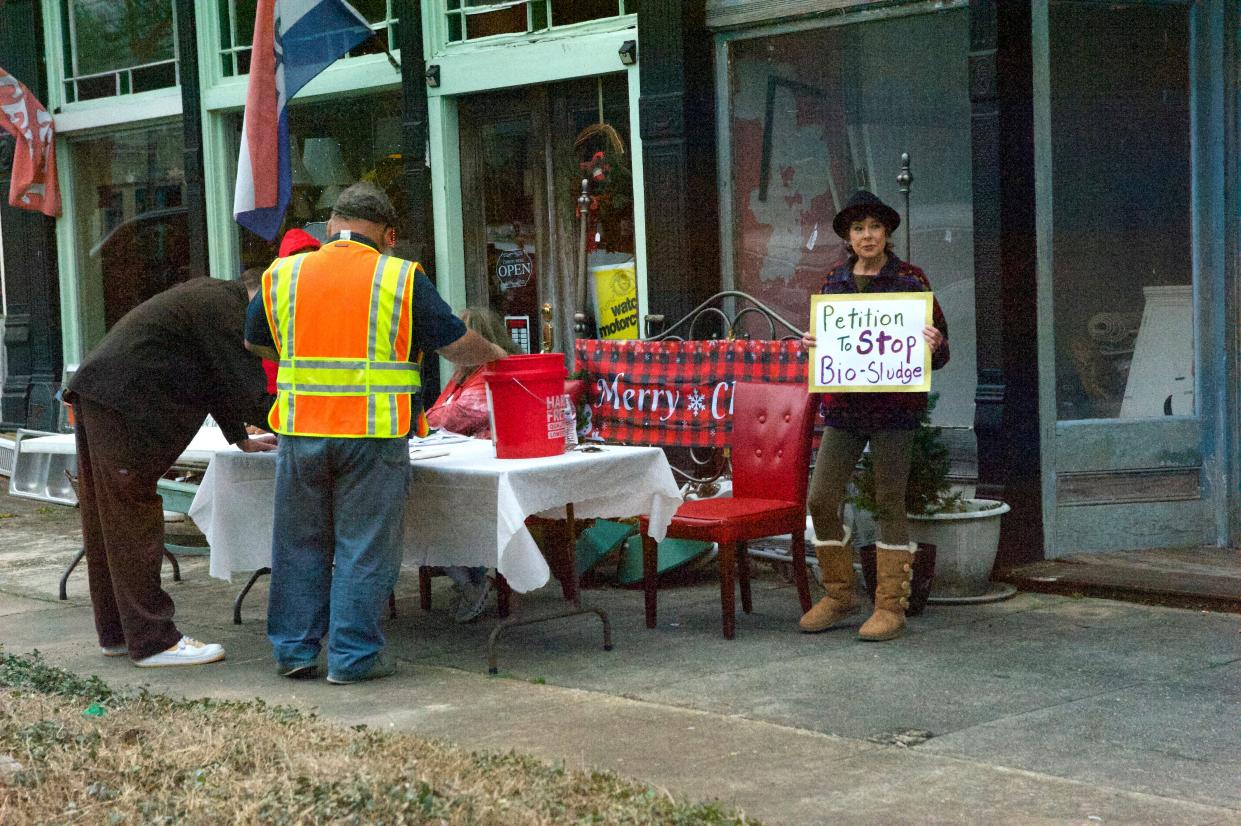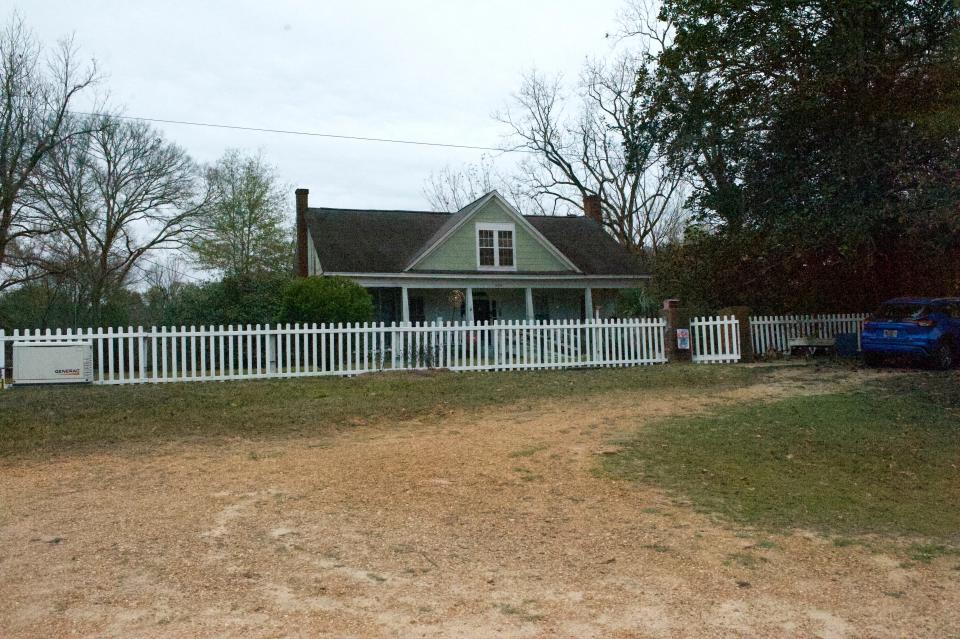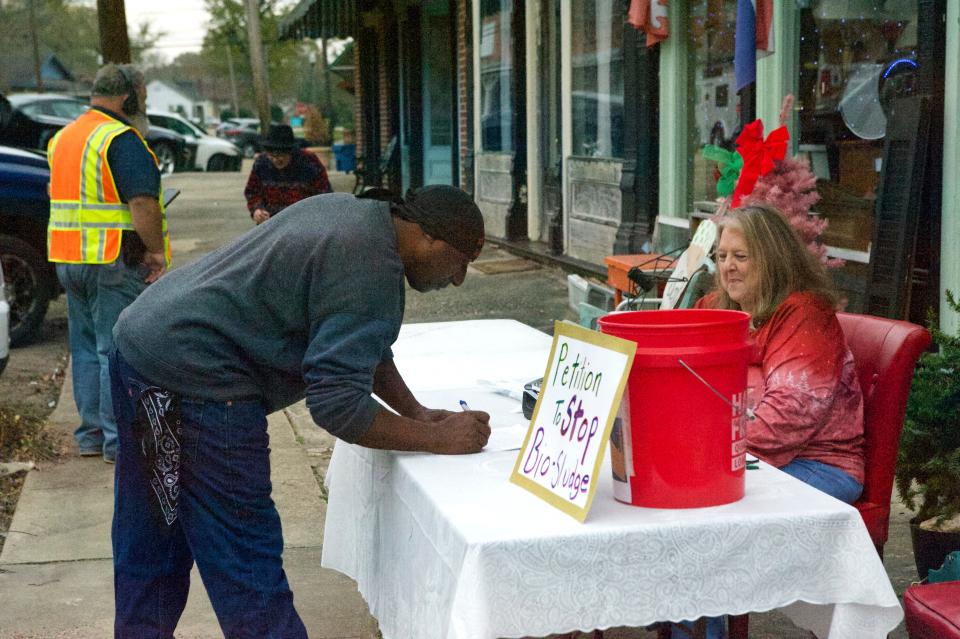'Forgotten step child:' Normally quiet Utica voices outrage, stops spread of sewage sludge

UTICA — About 45 minutes southwest of Jackson, sits the small, sleepy town of Utica.
With just under 800 residents according to the 2021 census, it falls on the edge of Hinds County, near the Copiah County border. The first thing one notices when stepping out of the car is how quiet it is. Empty store fronts line downtown Utica and old, seemingly abandoned houses surround it. Abandonment seems to be a common theme.
"This town used to be a grand place," said Scott Denley, a lifelong Utica resident. "The highway left us, the railroad left us, the high-school went. We used to have a Bernstein shirt factory, employed a lot of people. It closed, moved to Mexico."
But while there may not be much going on in Utica anymore, the residents are still very close knit and protective. When word got around about the potential use of biosolids, the whole town came together to raise their voices. All of a sudden, it wasn't so quiet in Utica.
Outrage hit the town in recent days over a now-killed proposal that would have dumped potentially environmentally harmful City of Jackson waste products in this rural community.
It started with a confusing government public notice in the newspaper and grew to a fever pitch with a Facebook group.
The notice advertised a public hearing on Dec. 18 inviting residents to a Hinds County Board of Supervisors meeting. The topic was to speak in favor or against the use of biosolids, also known as sewage sludge, as a fertilizer on approximately 533 acres of a 967-acre private property seven miles outside of Utica.
This was the confusing part: the notice stated the property was going to be “owned and operated by the City of Jackson. The site will be utilized for the land application of biosolids waste generated from the treatment of municipal wastewater…”
Sherril Strong, owner of Rebecca Rose Flea Market in downtown Utica was sent the notice. She also runs the Facebook group “Real Talk Utica,” so she decided to post the ad.
“We just kind of found out accidentally about it and we didn’t know what it was,” Strong said. “We think they were trying to get it by us without us knowing about it. Who looks at the little tiny public notices?"
The more than 2,000-member Facebook group exploded. Members started posting questions about what exactly biosolids are: What is going on with this land? Why is wastewater and sewage involved? Is this safe for the environment and surrounding farmlands?
Others were confused about the role the City of Jackson played in the notice: Why is Jackson taking over private land in Utica? Are they building some sort of waste facility? Is it a dump?
Community members prepared.
"I love Utica. Born and raised here. I'm going to fight for this little town one way or the other, because I love it," Denley said.
Details of the plan
Nancy Tenhet’s home has been in her family for generations. Located off of Mississippi Highway 27, the property has three buildings: a former general store her family used to run, the house she now lives in and another house to the right where her aunt used to live.
The backyard has 937 acres with areas her family used to farm crops such as cotton and corn. As she has aged, she decided to lease the land to a farmer named Matt McMullin, who recently tried to grow soybeans on the property. He was the one who planned to use the sewage sludge as fertilizer.

McMullin said he wanted to try the sewage sludge because it’s an organic fertilizer and is much cheaper than other commercial fertilizers.
“It’s a real good soil and has a lot of nutrients,” he said. “It’s a lower cost on the farmer. Since 2021, the cost of commercial fertilizers has doubled. So, that would be my benefit of it.”
Richard Harrell, an engineer with FC&E Engineering in Brandon, worked with McMullin to bring the fertilizer on the land he was farming. To do so, Hinds County must first amend its solid waste management plan, Harrell said, which is what the notice in the paper was advertising.
“Hinds County is tasked by state statute to have a solid waste management plan that deals with not only solid waste, but it specifically talks about municipal biosolids,” he said. “You have to go through steps to amend that and one of those steps is a public hearing.”
Once the plan is amended, a farmer would receive a permit to "land apply" from the Mississippi Department of Environmental Quality.
“The plan has to be approved by MDEQ and then once you do that you get a permit application to land apply (the fertilizer), which also has to be approved and is regulated by MDEQ,” Harrell said.
This is where the City of Jackson comes in. The city has a contract with a French transnational company called Veolia Solutions. The company has activities in three main services: water management, waste management and energy services.
Raw sewage: Backed up sewage destroyed their homes. Now a fight with the city over who's responsible
Veolia takes sewage from a plant in Jackson, puts it through a treatment process, dries it and turns it into a biosolids fertilizer. The farmer would then pick it up and land apply it to the property.
The confusing government notice
McMullin said the public notice was to blame as to why there was so much confusion and outrage over the fertilizer.
“The ad in the paper was very misleading and not worded correctly,” McMullin said. “Of course, I’ve been asked a lot of questions about this since that came out. Rumors and everything from a 900-acre sewage lagoon was going to be built, the City of Jackson was going to build a landfill or a waste plant. Just a lot of rumors and that’s what caused the uproar.”
Speaking on the front porch of her home, Tenhet said she had no idea about the ad until concerned residents and neighbors started calling her. Some showed up to her house. She was particularly upset at the fact that the ad stated the property was to be owned by the City of Jackson.
“I sure didn’t like the way the notice was worded,” she said. “It sounded like they had bought the property and I thought ‘oh my goodness, eminent domain and they didn’t tell me about it.”
Jackson Spokesperson Melissa Payne said the city did not post the notice and does not own the land.
Harrell and FC&E Engineering were the ones who wrote the notice. He said the company used the template that is found to write public notices on the MDEQ website.
“We did send that under MDEQ’s template to Hinds County,” Harrell said. “The template didn’t offer much information and that obviously caused some of the issues for sure.”
Due to the confusion regarding the notice, McMullin decided to pull his application for the biosolids fertilizer.
“It’s upset the community too much,” he said. “Too many people have Google-searched adverse effects of the fertilizer and you can find the bad in anything. Plus, people have shown up to Ms. Nancy’s (Tenhet) house that she doesn’t even know, and they want to talk to her about it. It’s become too much of a problem for her and I don’t want her to have to deal with that.”
Even though the application was pulled by McMullin on Dec. 1, Utica residents held a town hall last week to discuss the potential environmental problems that can arise due to biosolids. More than 50 frustrated residents showed up.
An agreement was made to form a "delegation" of 10 Utica residents to attend the next Hinds County Board of Supervisor's meeting on Dec. 18. The delegation would tell the supervisors that Utica residents do not support this type of land application, not only in their town but also throughout Hinds County and Mississippi.

Utica delegation: Not in our town or the state: Utica residents gather to oppose use of sewage sludge
What are the problems with biosolids/sewage sludge?
The confusing government notice lit a fire in the “Real Talk Utica” Facebook group. Members started internet sleuthing and doing research on the harmful effects biosolids have on the environment.
This is how the process of creating biosolids works, according to the EPA: When wastewater is treated “the liquids are separated from the solids. Those solids are then treated physically and chemically to produce a semisolid, nutrient-rich product known as biosolids.
Biosolids can then be used as a fertilizer as long as it's applied to land at the appropriate agronomic rate, which is regulated at both state and federal levels.
"Biosolids provide a number of benefits including nutrient addition, improved soil structure, and water reuse. Land application of biosolids also can have economic and waste management benefits," the EPA states.
But studies have shown sewage sludge may be more dangerous and not as environmentally friendly as originally thought. The issue is with the polyfluoroalkyl substances, also known as PFAS or “forever chemicals,” that are found in biosolids, even if it goes through proper treatment methods. There are thousands of different types of PFAS. They can be found in products humans use every day such as shampoo, dental floss, cleaning products, makeup and kitchenware.
More on PFAS Danger in the water: Mississippians in dark about 'forever chemicals' in drinking water
The EPA states that “one common characteristic of concern of PFAS is that many break down very slowly and can build up in people, animals, and the environment over time.”
In 2022, Maine became the first state to ban the use of biosolids as a land application due to concerns of PFAS. Other countries such as Switzerland and the Netherlands also have banned them. Companies such as Whole Foods, Heinz and Dole won't buy products grown in biosolids, according to a 2019 Guardian report.
PFAS in MS: Finding 'forever chemicals' in their tap water stirs Mississippians' health fears
Morgan Rutland is a neighbor of the Tenhet’s who owns property near the proposed site where the biosolids fertilizer was going to be applied. She strongly opposes the use of the fertilizer and has been one of the most vocal members of the “Real Talk Utica” Facebook group.
Her concern is how the sewage sludge will affect surrounding farms, wildlife, and streams in the future.
“Her (Tenhet’s) property slopes down onto my property, so if they start spreading that sludge it will come into my property. I have gardens and a pond that my kid’s swim in. I won’t ever let them swim in that again if they are spreading that around,” Rutland said.
But others, like McMullin, the farmer, and Harrell, the engineer, disagree with the residents claims.
“Utilizing municipal biosolids are generally perceived by EPA and others in the scientific community as an overall benefit to the environment by recycling a material into a usable product,” Harrell said. “While I respect citizens' concerns, with proper oversight and regulation, which is in place, these activities are protective of human health and the environment. In fact, many aspects of utilizing municipal biosolids have much more stringent protections of streams and rivers than the utilization of commercial fertilizers.”
Harrell said biosolids help decrease carbon emissions, reduce the need for commercial fertilizers and reduce dependence on imported foreign fertilizers.
A farmer using biosolids must follow stringent rules and regulations from the MDEQ, Harrell said, such as how many pounds you can apply for a specific crop and the amount of heavy metals in the fertilizer. Commercial fertilizers don’t have these requirements.
Also, a farmer must submit a soil test annually to be “analyzed for pH, nitrate, total arsenic, total cadmium, total copper, total lead, total mercury, total nickel, total selenium, total zinc and fecal coliform,” according to the MDEQ.
But Rutland, as well as Strong, Denley and other Utica residents, aren’t convinced.
“They say they have these requirements, but who knows if they are actually following them?” Rutland said.
Lack of communication regarding plans
About two weeks ago, outside of her flea market shop in downtown Utica, Strong and Denley set up a table with a petition for people to sign who were against biosolids. A sign read “Stop The Bio-Sludge.”

Strong and Denley questioned why county officials didn’t properly notify anyone about the plans.
As they were talking, multiple residents pulled up in their cars and signed the petition. Everyone seemed to agree that the lack of communication from officials was suspicious.
“The main thing is they tried to shove it through and nobody knows about it,” Denley, the lifelong Utica resident said. “We just want to be able to see and know what they are doing so we can do our research.”
Denley said he tried to call the county to request paperwork about the plans for the property, but none was available. Willette Jacobs, a librarian and lifelong Utica resident said the same.
Deneen Anderson — who at one point grabbed the “Stop the Bio-Sludge” sign and started flagging down passing cars to get people to sign the petition — said Utica residents are used to being out of the loop when it comes to decisions made at the county level. Residents tend to find out things after they have already been decided, even when it affects them directly, she said.
“We’ve always just been forgotten about here,” Anderson said.
“We’re the forgotten step-child of Hinds County is what I say. We’re the last to get anything,” Strong chimed in.
This article originally appeared on Mississippi Clarion Ledger: Debate over sewage sludge, biosolid waste, fertilizer use in Utica, MS

